
Yesterday, European Union (EU) leaders past and present gathered in Rome to celebrate the 60th anniversary of the treaty of Rome, which established the European Economic Community, the forerunner to the EU. In the decades since it was signed, European countries have worked successfully to fight against the return of the rampant nationalism that led to two world wars and the slaughter of millions of Europeans, finding a way to work together to create a largely peaceful, free and prosperous continent.
In 2017, the EU stands at a crossroads. Our common project is consistently attacked and denigrated by nationalists, often working with authoritarian regimes outside the EU, who wish to destroy the EU and once again set our communities and societies against each other.
It is ironic that, as we saw in the Brexit referendum, the post-war generation that benefited so much from European integration is now driving an explosion of Euro-sceptic nationalism. Young people, a majority of whom deeply value their European citizenship, too often face barriers to full political participation.
Nationalists tell us that the nation-state is best placed to deal with common challenges, but their argument fails the test of reason and ignores the nature of the trans-national threats we face. Climate change, international terrorism and the negative consequences of globalisation cannot be tackled by individual countries acting independently. If the EU of today did not exist, we would have to create it.
But while it’s important to appreciate what we have achieved, we must have a vision for the future too. I am no starry-eyed defender of today’s EU, which is in need of radical reform. The European single market, a British initiative, is something all Europeans can be proud of. But the prosperity that open markets and free trade have brought must be shared more widely. Far too many Europeans face unemployment, low wages and a lifetime of social exclusion. Millions are being left behind and political leaders have been too slow to acknowledge this.
Deep reform of the Eurozone is needed, to put in place a system of governance that will drive investment and create jobs. The timidity with which reforms have been implemented since the 2008 economic crash have undermined our common currency. In a fast-moving, digital, global economy, Europe must be able to adapt. To ensure this, we need real leadership and the political will to deliver change. Increased support for authoritarian and Euro-sceptic far-right parties, combined with dramatic falls in democratic engagement, should worry us all. Our political institutions must be streamlined and transparency in public institutions increased.
Sir Winston Churchill, a true pioneer of European unity, complained of capitalism’s “unequal sharing of blessings”. But capitalism can be tamed so that it benefits everyone, not just the few. It is important that Europe once again becomes a community of values. Europe’s refugee crisis and the threat of terrorism have tested our traditions of tolerance and individual liberty. The temptation to restrict freedoms and pull up the drawbridge to the rest of the world is real, but building walls will not solve the challenge of mass migratory flows caused by poverty and war. Limiting the freedoms we enjoy will only hand victory to those who seek to cause us harm.
As we remember the terrorist attacks in Brussels last year and witness yet more horror on the streets of London, it’s important that Europeans stand united to defend our open and tolerant societies. But this defence must go hand in hand with much more effective cooperation, external border controls and active measures to deter extremism.
We can be proud that the EU has legislated to tackle discrimination across our continent. Here too, however, the battle for equality and enhanced civil rights must progress. To defeat the right-wing populists who prey on our fears and seek to divide us, European leaders must offer an alternative vision of hope. We must not fall into the trap of sneering at those who disagree with us, but instead engage and debate with them.
The Dutch people recently rejected the politics of hate espoused by Geert Wilders. I hope the French people will also choose a European future in their upcoming elections. If so, we could witness the green shoots of a liberal spring and the rebirth of a new EU. Ultimately, nationalism will be rejected because its politicians are incapable of resolving the challenges we face. It is time for those who believe in a united Europe to stand up and be counted.
— Guardian News & Media Ltd









